Reading is Not the Holy Grail
Why Curiosity Matters More than Timelines...
Lots of parents tell me,
“If I can just get them to read, I’ll finally relax.”
Critics echo this, warning,
“If you don’t focus on reading, they’ll fall permanently behind.”
You’ve probably heard the phrase Learn to Read, Read to Learn. Traditionally, Kindergarten through 3rd grade emphasized pre-reading skills, with 4th grade marking the shift where kids read to learn. However, this timeline is shrinking. In some places, the Learn to Read stage is expected to be complete by 1st or 2nd grade, creating immense pressure.
I’ve seen kids labeled as “behind” at just six years old! One of my clients was talking with another mom at their Co-Op. She was saying that her curious, bright child wasn’t yet an independent reader, and the school suggested holding him back. In 1st grade! A SIX year old. Then other homeschooling moms chimed in - with the reminder that if they DON’T learn to read in those early grades, they’ll be Left Behind. Lots of more traditional homeschooling moms have a teaching backgrounds - so it’s not surprising that they continue on with what they were taught. My client though, thank heavens, she recognized that that Learn to Read - THEN Read to Learn concept is not learner focused - it’s so the SYSTEM can move more smoothly.
It’s alarming how narrowly defined “success” has become. Even with all the educational research focusing on incorporating play and the needs of the actual child as the learner - that all seems to get lost on them somewhere along the way.
So I want to unpack this issue and offer some perspective.
But first, if you’re new here, I’m Sue Patterson, your podcast host and at all things Unschooling Mom2Mom. I'm here to bring you an unschooling peptalk - I try to it weekly. Usually short - 10 min or so because I know you're busy with the kids... and the laundry...and the meals... and trying to help the kids have a full rich life! That's the basics of Unschooling!
Learning, it’s kind of a side byproduct!
So I’m here to give you practical ideas, resources that can help, and inspiration to encourage you.
So...about reading.
The Bell Curve of Reading Development
The bell curve reminds us that “average” is just the middle point. Many children don’t become proficient readers until 7 or 8 years old, even though schools push for earlier results. The brain doesn’t learn faster simply because schools demand it. Just like potty training and maturity - the brain does it when it’s ready.
And, the data used to establish these benchmarks of 7 or 8 years old, comes from traditional school environments, where children are taught to tests and rigid standards. They don’t have a lot of wiggle room.
But that’s not the case with Unschooling Kids. Kids in the Wild. They don’t follow standardized norms —they explore based on their interests. They may not be reading fluently yet, but they’re often acquiring vocabulary and knowledge through conversations, videos, and other experiences.
Their curiosity is what’s compelling them to learn more - not test scores and getting good grades. They move in that direction of their interests. They ARE learning more. All the time.
Are they reading? Maybe, maybe not.
Are they bumping into words that pertain to thethe topic they’re curious about? Probably.
If they’re not seeing it in print, they’re probably hearing it in conversation, or video.
Their own personal vocabulary list is growing.
We’ve all seen that, right? Your kid suddenly knows something that most kids their age don’t know.
And we spin around with, “What’s that? How did you know that?”
More often than not, they don’t even know.
This is a perfect example of learning being a byproduct of pursuing an interest or curiosity.
They’re showing you how they didn’t need a lesson plan for it, right?
Reassessing the Definition of Reading
So when parents worry their child “can’t read,” the comparison is often to grade-level expectations. But are those standards realistic—or necessary? Most young readers are still building foundational skills like recognizing letters and sounds or rhyming words. Simple words. Simple sentences.
But maybe the school-approved, 2nd grade reading list, doesn’t include anything about spiders, or the solar system, or the signs in your neighborhood community. These will be the basis of YOUR child’s very individualized vocabulary list. AND, remember that bell curve? Half of those kids in that classroom aren’t retaining their own standardized approach to reading... they’re on the left side of that Bell curve.
So let’s not sweep with a broad brush and say ALL those 2nd graders are readers and my little guy isn’t.
Because that probably isn’t even accurate!

It's VERY likely that those lower grades are doing what you and I (and also their teachers) would consider “pre-reading” activities - building blocks toward reading. Sure, their report card calls it "Language Arts" or "Reading." But it’s the rudimentary PRE-reading stage. Our kids can hang out in this stage for as long as they need to. Their brain is amassing what they need to move forward. And they probably ARE moving forward, and you’re not noticing the progress. It’s tiny... but it adds up.
If you’re worried about your child’s progress, I want you to pause. .
Forget about their age or the artificial bell curve.
3 Simple Actions to Shift Your Perspective
Instead of focusing on what they
can’t do, try these three things:
- Hobbies. Think about their hobbies—how have they improved over time?
- Progress. Compare what they know now to a year ago—what skills have they gained?
- Surprises. Recall the moments when they surprised you with their knowledge or vocabulary—what were they curious about?
What subject category might any of these fall into?
Was it a vocabulary word they started using - they’re growing their language arts abilities.
Was it something about natural disasters? Science.
Was it something about the election or politics? Social Studies.
They’re all tiny little seeds of knowledge - but they count and they add up.
These are all signs of learning. You can see them if you look!
My
Everything Counts ebook and the Seasonal Unschooling Guides can help you see how everyday activities align with subjects like science, social studies, and language arts, and math..
But don’t let fear distract you from doing this. That voice in your that wants to keep you conforming and safe, it’s going to list out what they DON’T know… but that’s easy to see. Your job is to say,
“OK, hush now. I’m looking for something else right now.”
Learning Beyond Reading
But probably the most important reason I’ve said that Reading is not the Holy Grail is because “Learning” encompasses so much more than reading. When we’re in school, reading is the path tomore knowledge.
But it’s really not the ONLY way to get there. Schools treat reading as the primary pathway to knowledge because of their structure and resources.
When we’re in school... back in the day... especially if we went to school before the internet took off - or even during that first phase when everyone thought it was going to be the end of us all - we saw how the educational establishment resisted technology. Progress is really slow in big bureaucracies. If we have a kid in school now, schools may not catch up in time.The funding or resources may not get there before your kid graduates.
But at home, we have all kinds of flexibility. We can embrace multiple learning methods. Whatever works. And we can pivot if something else is available or works better next week. We don’t have to petition a school board or hope the teacher is willing to change up her lesson plans. We can budget for what OUR kid needs and move in that direction. Because we’ve spent so much timein schools, we’ve embraced that idea that reading is the only path to learning. Sometimes without even realizing it.
Your child might learn through:
- YouTube videos or podcasts
- Conversations with friends and family
- Hands-on trial and error
- Exploring their environment
Reading is valuable, but it’s not the only way to learn. Recognizing and celebrating alternative learning methods can ease the pressure on you and your child. It’s not always easy, sometimes we don’t even know we’re doing it. Or we find ourselves agreeing with someone who says “Learn to Read" and THEN “Read to Learn.” We’ve spent a lot of time in that school approach that told us there was only one path. It’s why we deschool - because you can tap into the REALITY of all that life has to offer your child!
Resources to Support Literacy
If your child is in the pre-reading stage, I have an
Unschooling Guide about Learning to Read
filled with ideas to make your home literacy-friendly. I’m also planning a mini-course on this topic, similar to my Learning Math Without Curriculum course. Because let’s face it - we parents aren’t all big readers either. We like videos and worksheets and audio-versions of material. We process differently too. Reading isn’t the Holy Grail for many us either, right?
But until that’s ready - it’s on my ToDo List for this Spring - you can tap into that PDF—it’s packed with tips to help your child when they’re ready.
Let’s support our kids in learning to read without unnecessary pressure. Learning is happening all the time—it’s not waiting on the other side of the
Learn to Read door. They’re learning in so many ways - we just have to notice it.
Have a great week! Leave a comment, subscribe, and share to spread the word that unschooling works.
For more tips, you can go next to my video
Stop Duplicating School!
You can do this—happy unschooling! See you next week.
















